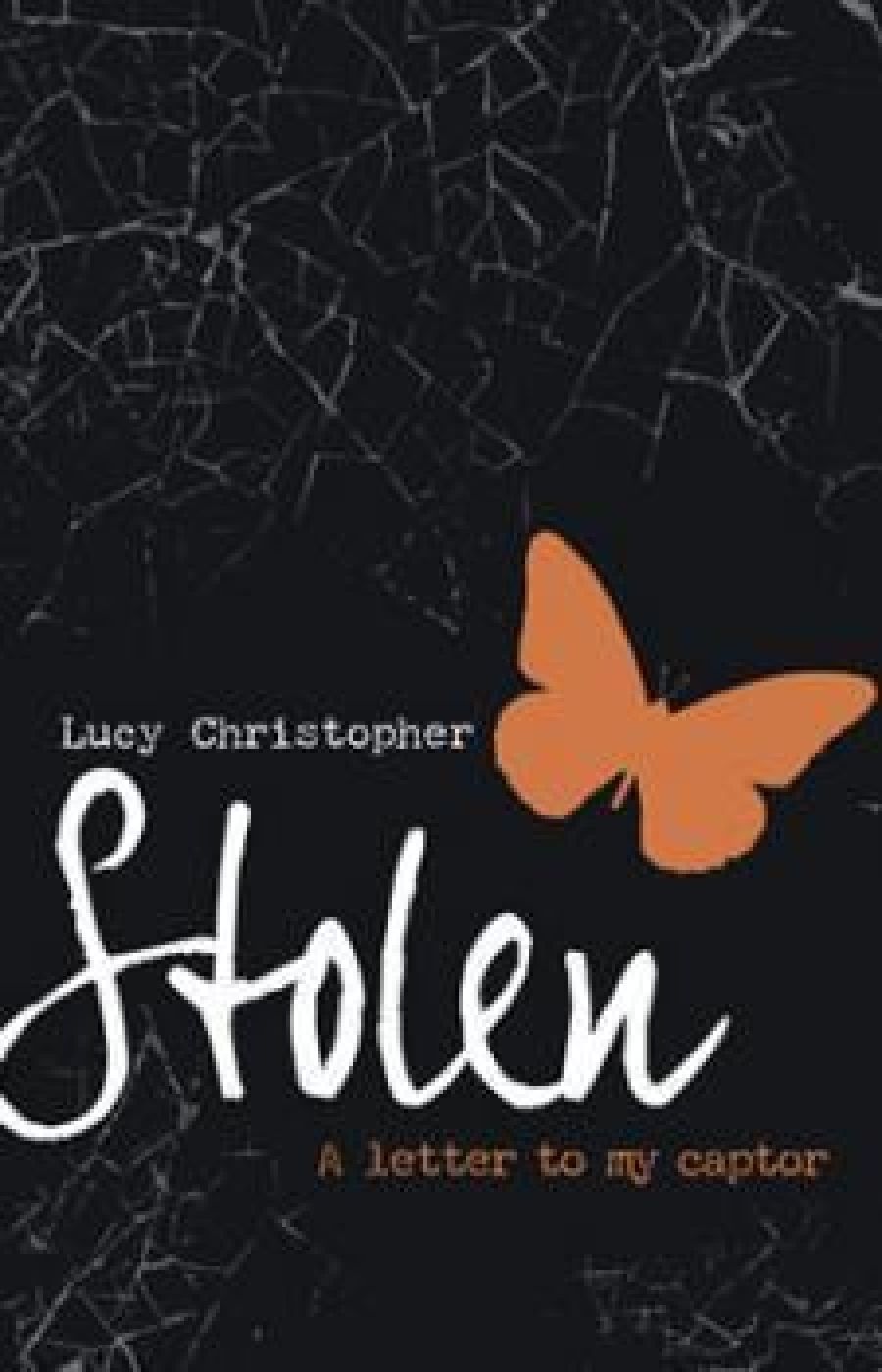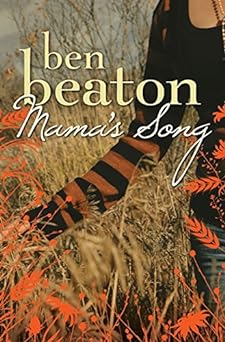
- Free Article: No
- Contents Category: Young Adult Fiction
- Review Article: Yes
- Article Title: Psychology of Duress
- Online Only: No
- Custom Highlight Text:
A certain sub-genre of Young Adult fiction thrives on the psychology of duress – on the useful friction yielded by placing a young heroine in a near-impossible situation and asking the reader: ‘What would you do? How would you cope?’ Two recently released, formidable début novels have utilised this formula, with some impressive results.
- Book 1 Title: Stolen
- Book 1 Subtitle: A Letter To My Captor
- Book 1 Biblio: Chicken House for Scholastic Australia, $17.99 pb, 301 pp
- Book 1 Cover Small (400 x 600):

- Book 2 Title: Mama's Song
- Book 2 Biblio: Black Dog Books, $16.99 pb, 199 pp
- Book 2 Cover Small (400 x 600):

When Gemma revives, she is tied to a bed in a newly built compound somewhere in the middle of nowhere. Her gentle yet insistent captor explains that there is no place to run to, and following a few failed escape attempts, Gemma begins to acquiesce to her fate. Throw in a spectacular and dangerous desert backdrop and a healthy dose of Stockholm Syndrome, and Christopher has the makings of a tensely wrought psychological thriller.
Perhaps the most distinctive thing about Stolen is the way the story is told. A closely cropped, intensely claustrophobic first-person narrative, the book purports to be one long letter written by Gemma to her kidnapper. The context within which this letter was composed is finally revealed in the closing pages; it is a credit to the author that she is able to sustain this device for so long. It also helps to avert any incredulity, as we discover things as Gemma discovered them, such as Ty’s tragic and lonely upbringing, and the strange yet convincing past these two characters share that has led them to this point. Essentially, Christopher wants us to consider the ethics of Ty’s act. What are the parameters of abduction? ‘I’ve saved you from all of that,’ Ty insists. ‘Saved, not stolen.’
Equal parts creepy stalker and noble savage, Ty is an impressive fictional creation, the reader’s sympathy for him enhanced by his environmental philosophising and an endlessly described body-to-die-for. However, his representation as a kind of white aborigine, in touch with the land and its spiritual dimensions, feels not without its problems, though perhaps this anxiety about how to engage with Australia’s indigenous heritage is not something that would bother Christopher’s predominantly British readership.
There are other ways in which it is hard to imagine Stolen being written by an Australian author. Some of Christopher’s locational shorthand – Ty always smells like eucalyptus, for example – feels overdone and provokes something akin to a cultural cringe. At the same time there is something refreshing about seeing the Australian desert through the eyes of a writer not constrained by a fear of cliché. In this Christopher does an admirable job, the setting of her novel truly becoming a third character in a stiflingly enclosed narrative.
Stolen has been likened to Robert C. O’Brien’s Z for Zachariah (1975) and John Fowles’s The Collector (1965), and indeed owes a debt to these novels. Curiously, it also reminded me of another psychological tour de force set against the Australian outback – Elizabeth Jolley’s The Well (1986). Perhaps Stolen is what might have happened if the boy down the well really had climbed out, gotten rid of Hester and spirited Katherine away.
John Marsden has trumpeted the book – high praise from the author of Letters from the Inside (1991), a local classic in this narrative mode. The image of a young British woman held captive in the Australian desert by a madman is strangely familiar. Think of the film Wolf Creek (2005) or the many books published in the wake of Bradley John Murdoch’s conviction in 2006 for the murder of Peter Falconio and abduction of Joanne Lees. Stolen caused something of a stir upon its release in the United Kingdom, partly because of its resemblance to other real-life abductions. The publisher’s foreword describes the book as ‘threatening, challenging and controversial’, though this is negated by a somewhat limp ending and by the patronising tone which emerges to tie up loose ends in the final pages.
The opening of Ben Beaton’s Mama’s Song features another young woman in the midst of duress of a different kind – the throes of childbirth. Fleeing an as yet undisclosed ultimatum from a distant yet controlling mother, Georgina arrives on her grandmother’s doorstep in country New South Wales only to discover that she died some months ago. Georgina promptly goes into labour. The birth of her daughter Hannah provides the nexus of the novel, the story simultaneously travelling back into the past to explain what has led George to this point and forwards through her first intense week of motherhood. Seventy-seven mini-chapters alternate between filling in the gaps and depicting a young woman struggling to become a mother.
Beaton’s studied first-person narrative takes time to establish itself, but we are introduced to George at a moment of radical change, so it seems appropriate that it takes her a while to find her voice. The majority of the present-day narrative takes place within the confines of a country hospital maternity-ward, adding to the concentrated air of claustrophobia. This also feels fitting: maternity wards are strange, otherworldly places.
Mama’s Song is remarkably understated. Beaton’s short, uncomplicated sentences convey how simply big things can happen: an unwanted pregnancy, a rash but sensible decision, the way words can bruise and comfort, the sudden beginning or end of a friendship. One short passage showcases this lightness of touch, demonstrating how George’s pregnancy imperceptibly opens a gulf between her best friend Merci and herself, so that a hearty invitation morphs into an unenthusiastic one which then becomes, ‘I see Merci walk past my door. She doesn’t stop, or even look in to say hi. She doesn’t even break her stride.’
Only on occasion does George’s interior monologue resemble the thoughts of her adult author. Beaton’s shadow looms at other times, too. Love interest Sam’s iPod track-listing for example – The Pixies, Radiohead, Nick Cave – seems more a generation-Xer’s taste in music than a present-day seventeen-year-old. These however are minor quibbles.
A key trope running through the book is that of the strong woman, specifically the strong mother, defined by the solidarity shared by the women George meets in the maternity ward. Though her own mother has failed her, George finds a surrogate in the kindly Mary, and a wise confidante in the young but forthright Nasreen. Other strong women populate the small cast, such as ‘the cool nurse’ Jude, and Nasreen’s aunt, who dispenses the advice from which the novel draws its name: ‘You need to show your baby [that] her mother knows best. You need to sing her your mama’s song and tell her to be calm and still when her mama sings.’
Another chord running throughout Mama’s Song, softly strummed yet audible, is a discernible pro-life message. George’s eleventh-hour bolt from an abortion clinic recalls the film Juno (2007). In one scene, each mother takes ‘a moment with our babies, offering a silent prayer’. Late in the text, George comes to realise that Hannah, like every baby, is ‘a blessing’. None of this is explicit enough to be called an agenda, but Beaton’s book is in many ways thoroughly old-fashioned. Ending on a promising but nicely unresolved moment, it leaves the reader comfortable in the knowledge that George has found her mama’s song.


Comments powered by CComment